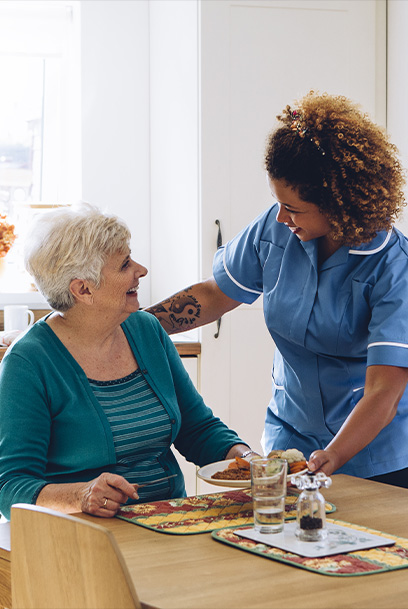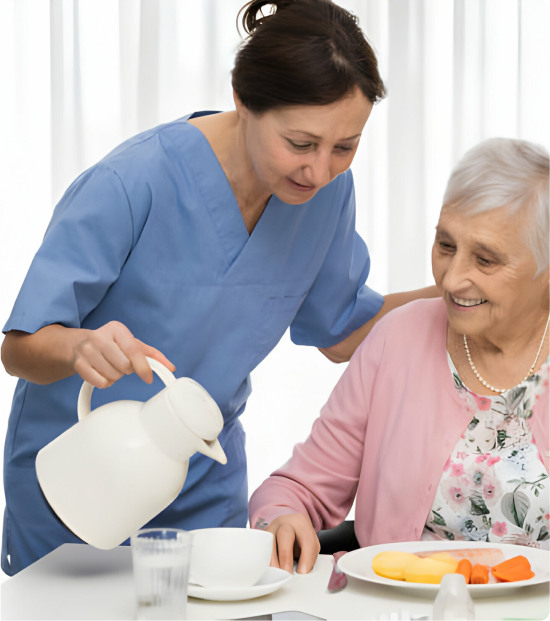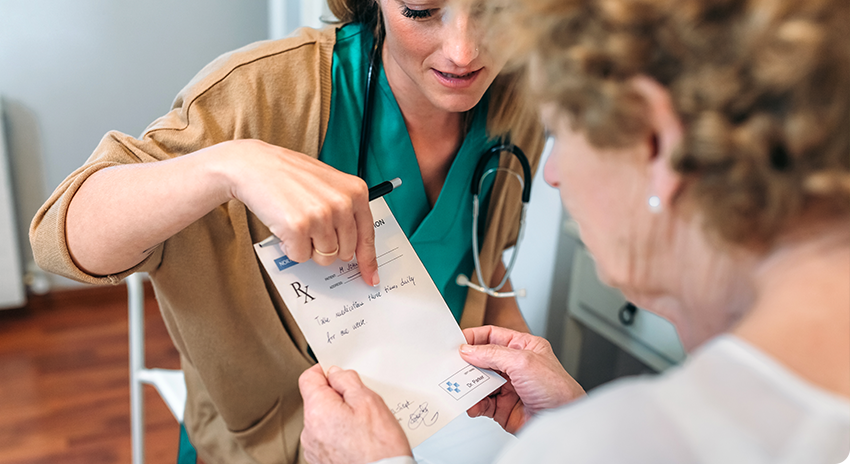This website uses cookies so that we can provide you with the best user experience possible. Cookie information is stored in your browser and performs functions such as recognising you when you return to our website and helping our team to understand which sections of the website you find most interesting and useful.
Home Care In Alexandria, VA

They say that your golden years are the best years of your life. For most older Americans, that's how it should be - a time to relax, reflect, and live life in a familiar place. After all, senior citizens in the U.S. have worked tirelessly to build a better economy, serve their communities, and raise families.
However, as seniors grow older, completing daily tasks like showering and enjoying activities such as visiting the historic Old Town Alexandria Waterfront gets harder without someone by their side. Unfortunately, many older Americans aren't able to rely on their adult children for help. The reality in today's world is that family members do not have the skills or time to dedicate to caring for their parents. That's where Always Best Care Senior Services comes in.
Our in-home care services are for people who prefer to stay at home as they grow older but need ongoing care that family or friends cannot provide. More and more older adults prefer to live far away from long-term, institutionalized facilities and closer to the place where they feel most comfortable - their home. Home care in Alexandria, VA is a safe, effective way to give your loved ones the care they need when they need it the most.

 Home Care Services
Home Care Services
- Home Care in Alexandria, VA
- The Always Best Care Difference
- Types of In-home Care in Alexandria, VA
- Benefits of Home Care in Alexandria, VA
- Aging in Place: The Preferred Choice for Most Seniors
- Affordable Care Plans
- Compassionate Care. Trusted Caregivers
- Assisted Living Referral Services
- Taking the First Step with Always Best Care
 Service Areas
Service Areas
The Always Best Care Difference
Since 1996, Always Best Care has provided non-medical in-home care for seniors to help them maintain a healthy lifestyle as they get older. We are proud to have helped more than 25,000 seniors maintain higher levels of dignity and respect. We focus on providing seniors with the highest level of in-home care available so that they may live happily and independently.
Unlike some senior care companies, we genuinely want to be included in our clients' lives. We believe that personalized care is always the better option over a "one size fits all" approach. To make sure our senior clients receive the best care possible, we pair them with compassionate caregivers who understand their unique needs. That way, they may provide care accordingly without compromising their wellbeing.
The Always Best Care difference lies in life's little moments - where compassionate care and trustworthy experience come together to help seniors live a fruitful, healthy life. Whether you are an aging adult that can't quite keep up with life's daily tasks or the child of a senior who needs regular in-home services, Always Best Care is here to help.
“Rashid Farrell, the Owner, is very attentive, helpful and sincere. He follows up with clients”
“We started with Always Best Care mid July 2021. They worked with us and her”
“I have been with Always Best Care for over a year. I have a neurological”
“Always Best Care truly took the stress out of my grandfather’s post-surgery recovery. I was”
“Pleasant experience with the care professionals who provided support and care. Lankgo was very helpful”
“We did not end up getting care from Always Best Care since our father uses”
“My family and I were blessed to find Rashid and his wonderful team of caregivers!”
“I'm writing this review as a friend and sometimes caregiver of a person with dementia.”
“Hi, Please know my Five Stars rating is very real & very honest! I reached out”
“My family has used Always Best Care for about five months now. We are grateful”
“Scott and his staff were excellent to work with. We quickly needed all night”
“My mother required some post-surgical assistance as she was healing from a knee replacement procedure.”
“Scott Maquire, owner is helpful and will work with you to develop a plan that”
“I had caregivers for my elderly mother from Always Best Care for close to three”
“Finding Always Best Care was a game changer for me and my mom (after trying”
“Our experience with Always Best Care Senior Services of Herndon was positive. Excellent communication and”
“Our family was delighted to have found Always Best Care Senior Services, having been recommended”
“With my wife bed bound and I the only caretaker, I was soon exhausted. Scott”
“I am a past client of this provider My mother was in hospice care and needed”
“Scott and his team provided excellent companion care for Mom as her dementia progressed. They”
“I had the good fortune to work for Scott Maguire at ABC following my move”
“Anyone reading this is likely where my family was. Completely exhausted and desperate. My husband”
“Wow--my family has worked with a number of companies to assist us through the years”
“Over the last year Scott Maguire, at Always Best Care Senior Services, has been a”
“I worked at the agency for a year as a caregiver and then as a”
“Rashid Farrell, the Owner, is very attentive, helpful and sincere. He follows up with clients and truly does all he can to make them and their loved ones happy. I highly recommend using Always Best Care to care for anyone in need of care.”
“We started with Always Best Care mid July 2021. They worked with us and her insurance to provide me time to do things I needed to do. We have had the same caregivers for the past 3 years and we love them!! Brenda C. is absolutely terrific!! Jeanine is fabulous!! From the start, they have worked with and around our schedules, especially when we have had changes. Working with Scott M. the original manager/owner, and now with Rashid F., the new manager/owner has been really easy and enjoyable. Everyone as been easy-going and helpful.”
“I have been with Always Best Care for over a year. I have a neurological condition that affects my movement and balance. My caregiver has helped me make doctor appointments and attend weekly yoga. My caregiver is always punctual. I highly recommend the company.”
“Always Best Care truly took the stress out of my grandfather’s post-surgery recovery. I was so worried about how he would manage, especially since I couldn’t always be there due to work, but he was in amazing hands. The caregivers were compassionate, attentive, and made his recovery process so much easier. Knowing he was well cared for gave me peace of mind. I highly recommend their services!”
“Pleasant experience with the care professionals who provided support and care. Lankgo was very helpful with taking me to doctor's appointments, to the pharmacy, and entertaining my free time by playing cards. Rashid, the owner, has been so helpful, so understanding, and so kind and has helped me tremendously in my caring. I would recommend Always Best Care of Fairfax!”
“We did not end up getting care from Always Best Care since our father uses Medicaid, but they were very kind and helpful in connecting us with another agency who accepts Medicaid, and followed up with us to make sure we had reached the other agency.”
“My family and I were blessed to find Rashid and his wonderful team of caregivers! From the first day the emphasis was always on our father and how they could meet his needs and keep him comfortable. They took care of our dad as if he was a member of their family. The caring starts at the top with Rashid, who is amazing. He knew my father well and visited him often, always keeping us informed. He would be at the house to orient new care team members and introduce them to our father including weekends and shift change at 8 pm. When we could not be with our father, we knew he was in great hands. We were so fortunate to have found Rashid and his wonderful team of caring and empathetic caregivers, they were a blessing to us during a very difficult time.”
“I'm writing this review as a friend and sometimes caregiver of a person with dementia. She has received in-home services from Always Best Care for several years. Her home care aide, Brenda, helped my friend with things like organizing her files, paying bills, finding and keeping track of her things, canceling subscription items bought online and then not remembered, medication management, etc. She was kind, patient, and highly flexible. The company owner has also been wonderful to work with; kind, patient, flexible and responsive. I highly recommend ABC Senior Services!”
“Hi, Please know my Five Stars rating is very real & very honest! I reached out to Always Best Care S.S. (Fairfax County VA) & received the best customer service from Rashid after 11 exhausting calls. What I actually needed at that time they did not offer, but Rashid still proceeded to assist me. Rashid showed caring concerns and patience. Rashid even reached out on my behalf to others in his field of work as well provided me with further resources outside of his own practice! Not only did Rashid provide other resources, Rashid followed up with me the next day!! Mind you I missed the call/phone tag & Rashid still returned my call until we connected! That’s above beyond…. I was relieved of a lot of burden & false hope. The resources ended up being a huge success. So I want to highly recommend Contacting Always Best Care S.S. And have the pleasure I experienced with Rashid an awesome person, very professional top notch customer service for your needs. Rashid Farrell thank you for being you???? Octavia”
“My family has used Always Best Care for about five months now. We are grateful for the help and advice we have received. The home health aide sent to us has been outstanding and Scott Maguire has always been available for advice. We recommend ABC to anyone who needs its services.”
“Scott and his staff were excellent to work with. We quickly needed all night companions at the hospital and home for more than two months. Scott responded to our needs and provided some wonderful people. Highly recommend.”
“My mother required some post-surgical assistance as she was healing from a knee replacement procedure. Scott was very helpful in arranging a dependable and compassionate caregiver for the time which we needed the assistance. I could confidently attend to my work schedule knowing that my mother was receiving the help she needed for medication reminders, meal preparation, exercise prompts and having a supportive ear during the convalescence from Sue. I recommend Always Best Care Senior Services very highly.”
“Scott Maquire, owner is helpful and will work with you to develop a plan that works best for your situation. My mom loves here caregiver and I highly recommend Always Best Care Senior Services for peace of mind,”
“I had caregivers for my elderly mother from Always Best Care for close to three years, and I would unreservedly do so again. It took a little bit to find providers who were right for my mother’s particular needs (besides becoming increasingly frail, she had severe anxiety), and for my schedule (my mother was living with me), but owner Scott Maguire was extremely accessible and responsive, and ultimately we established an arrangement that worked well. The caregivers were honest, reliable, caring, and responsive to my feedback, and communication via daily logs and in-person reporting ensured I was aware of anything I needed to know. I found the advantage of working with a small company whose owner I never had trouble reaching or getting to understand my needs a huge factor in what made this agency work for me.”
“Finding Always Best Care was a game changer for me and my mom (after trying several other companies). Scott was professional and responsive. He found the perfect companion for my mom (Kendall). She was reliable, flexible, thoughtful, kind and an excellent communicator. Within a short time, my mom began asking when that "nice Kendall" was coming again. I cannot recommend ABC Senior Services highly enough. I will always be grateful for their services.”
“Our experience with Always Best Care Senior Services of Herndon was positive. Excellent communication and billing was easy.”
“Our family was delighted to have found Always Best Care Senior Services, having been recommended by another senior care agency. They quickly responded with excellent experienced care givers who were terrific in caring for my father, giving him the attention he needed. The personal attention given by the owner was terrific. The nursing consultation was also appreciated. I highly recommend this agency.”
“With my wife bed bound and I the only caretaker, I was soon exhausted. Scott and Always Best Care came to my rescue by providing me with the help I needed to get through this ordeal. The young lady that came 7 hours a day was a Godsend to me. She was attentive and caring and made my wife's life so much better, no to mention my own. I would not have made it through without her. Scott dealt directly with the insurance people saving me from having to manage any record keeping and payment issues. That also relieves a lot of stress. I would strongly recommend Always Best Care to anyone in need of such services.”
“I am a past client of this provider My mother was in hospice care and needed help and companionship and I couldn’t be there 24/7. Always Best Care sent providers to be with her and I can’t say enough good things about them. They were compassionate and skilled, and always there when I needed them. I could relax knowing that my mom was in good hands.”
“Scott and his team provided excellent companion care for Mom as her dementia progressed. They ran errands with her, provided meals for her and Dad, and generally kept her engaged and entertained during the pandemic. Scott was a wealth of knowledge and always available to help us navigate the disease and it’s effects. I highly recommend him and his team!”
“I had the good fortune to work for Scott Maguire at ABC following my move from New Hampshire to Virginia. I was with the agency for eight years until last month when I moved to Florida. Scott always cared about his clients, and had a knack for matching them with compatible caregivers. He was always available for questions and concerns. I had opportunities to work for other agencies between clients, but chose to stick with Always Best Care, because the name of the agency says it all.”
“Anyone reading this is likely where my family was. Completely exhausted and desperate. My husband and I had been primary caregivers for my in-laws when one ended up with non-COVID pneumonia and the other had a stroke followed by a fall-- all since early January. Now vaccinated, they were ready for outside help and wanted it to start right away. We had been talking to an agency throughout the process that came highly recommended, Old Dominion. But they were not able to turn around an awesome caregiver in 72 hours and recommended I call one of their friendly competitors-- Scott- At Always Best Care Senior Services in Herndon. Scott understood that we were looking for stopgap care until Old Dominion could find someone permanent and after a call Friday afternoon, he had someone at my in-laws on Monday, 8:00am. And she was terrific. It makes all the difference to have such a positive experience from the beginning. My in-laws were very pleased and appreciated that Scott had been upfront that the caregiver he had available had a thick accent and that, combined with a mask, might be challenging for someone hearing impaired. This is an issue for my mother in law and it made all the difference that she knew in advance. The other thing I appreciated is that all of Scott's caregivers are vaccinated or on their way. The one he sent was getting her second shot later in her start week with us. Unfortunately, my father-in-law is going to need a stint in skilled rehab, so we won't be continuing with Scott's wonderful caregiver. But Scott stepped up to help provide some insiders perspective on facilities. There was nothing to gain from that, except putting goodness out into the world. The process is overwhelming and it made such a difference to get his perspective. We could not have been more pleased to have had such a terrific experience and highly recommend Always Best Care Senior Services if you or a loved one is looked for quality care.”
“Wow--my family has worked with a number of companies to assist us through the years in the Annandale area. This is the best. Scott Maguire--the owner is responsive, collaborative, and empathetic to unique questions and requirements. This is the company we will work with hereafter.”
“Over the last year Scott Maguire, at Always Best Care Senior Services, has been a wealth of information for helping me with my ageing parents. Pre Covid, we were looking into continuing care options and he went through all of our options in a manner that was easy to understand (when you are new to the system)! Then Covid hit, and we decided to keep our parents at home as long as possible. Since, he has been very quickly responsive about in-home care at a stressful time for all. We have really appreciated his help! I would highly recommend his services.”
“I worked at the agency for a year as a caregiver and then as a supervisor. The owner is a very nice and caring person, very hands on and always there to help. I would recommend this agency to anyone that needs help with their loved one.”
What is Non-Medical Senior Care in Alexandria, VA?

Home is where the heart is. While that saying can sound a tad cliche, it is especially true for many seniors living in America. When given a choice, older adults most often prefer to grow older at home. An AARP study found that three out of four adults over the age of 50 want to stay in their homes and communities as they age.

When you begin to think about why, it makes sense. Home offers a sense of security, comfort, and familiarity.

The truth is, as we age, we begin to rely on others for help. When a family is too busy or lives too far away to fulfill this role, in-home senior care is often the best solution. Home care services allow seniors to enjoy personal independence while also receiving trustworthy assistance from a trained caregiver.

At Always Best Care, we offer a comprehensive range of home care services to help seniors stay healthy while they get the help they need to remain independent. As your senior loved one gets older, giving them the gift of senior care is one of the best ways to show your love, even if you live far away.

Types of Elderly Care in Alexandria, VA
To give our senior clients the best care possible, we offer a full spectrum of in-home care services:

Personal Care Services
If your senior loved one has specific care needs, our personal care services are a great choice to consider. Personal care includes the standard caregiving duties associated with companion care and includes help with tasks such as dressing and grooming. Personal care can also help individuals with chronic conditions like diabetes.
Common personal care services include assistance with:
- Eating
- Mobility Issues
- Incontinence
- Bathing
- Dressing
- Grooming


Home Helper Services
Sometimes, seniors need helpful reminders to maintain a high quality of life at home. If you or your senior has trouble with everyday tasks like cooking, our home helper services will be very beneficial.
Common home helper care services include assistance with:
- Medication Reminders
- Meal Preparation
- Pet Care
- Prescription Refills
- Morning Wake-Up
- Walking
- Reading


Companionship Services
Using this kind of care is a fantastic way to make life easier for you or your senior loved one. At Always Best Care, our talented caregivers often fill the role of a companion for seniors. That way, older adults can enjoy their favorite local activities, such as visiting Jones Point Park with friends while also receiving the care they need daily or weekly.
Common companionship services include:
- Grocery Shopping
- Transportation to Appointments
- Nutritional Assistance
- Conversation
- Planning Outings
- Completing Errands
- Transportation to Community
- Events and Social Outings


Respite Care Services
According to AARP, more than 53 million adults living in the U.S. provide care to someone over 50 years old. Unfortunately, these caregivers experience stress, exhaustion, and even depression. Our respite care services help family caregivers address urgent obligations, spend time with their children, and enjoy nearby activities. Perhaps more importantly, respite care gives family members time to recharge and regroup. Taking personal time to de-stress reduces the risk of caregiver burnout. So, if you've always wanted to eat at the local Ada's on the River or visit Captains Row Old Town Alexandria, don't feel bad. Doing so is great for both you and your loved one.
At the end of the day, our goal is to become a valuable part of your senior's daily routine. That way, we may help give them the highest quality of life possible. We know that staying at home is important for your loved one, and we are here to help make sure that is possible.
If you have been on the fence about non-medical home care, there has never been a better time than now to give your senior the care, assistance, and companionship they deserve.

Benefits of Home Care in Alexandria, VA
Always Best Care in-home services are for older adults who prefer to stay at home but need ongoing care that friends and family cannot provide. In-home care is a safe, effective way for seniors to age gracefully in a familiar place and live independent, non-institutionalized lives. The benefits of non-medical home care are numerous. Here are just a few reasons to consider senior care services from Always Best Care:
Always Best Care offers a full array of care options for patients at all levels of health. With our trusted elderly care services, your loved one will receive the level of care necessary for them to enjoy the highest possible quality of life.
Request More Information
Aging in Place: The Preferred Choice for Most Seniors
While it's true that some seniors have complicated medical needs that prevent them from staying at home, aging in place is often the best arrangement for seniors and their families. With a trusted caregiver, seniors have the opportunity to live with a sense of dignity and do so as they see fit - something that is unavailable to many older people today.
In-home care makes it possible for millions of seniors to age in place every year. Rather than moving to a strange nursing home, seniors have the chance to stay at home where they feel the happiest and most comfortable.
Here are just a few of the reasons why older men and women prefer to age at home:
How much does a senior's home truly mean to them?
A study published by the American Society on Aging found that more than half of seniors say their home's emotional value means more than how much their home is worth in monetary value. It stands to reason, then, that a senior's home is where they want to grow old.
With the help of elderly care in Alexandria, VA, seniors don't have to age in a sterilized care facility. Instead, they can age gracefully in the place they want to be most: their home. In contrast, seniors who move to a long-term care facility must adapt to new environments, new people, and new systems that the facility implements. At this stage in life, this kind of drastic change can be more harmful than helpful.
Institutional care facilities like nursing homes often put large groups of people together to live in one location. On any given day, dozens of staff members and caregivers run in and out of these facilities. Being around so many new people in a relatively small living environment can be dangerous for a seniors' health and wellbeing. When you consider that thousands of seniors passed away in nursing homes during the COVID-19 pandemic, opting for in-home care is often a safer, healthier choice for seniors.
Aging in place has been shown to improve seniors' quality of life, which helps boost physical health and also helps insulate them from viral and bacterial risks found in elderly living facilities.
For many seniors, the ability to live independently with assistance from a caregiver is a priceless option. With in-home care, seniors experience a higher level of independence and freedom - much more so than in other settings like a nursing home. When a senior has the chance to age in place, they get to live life on their own terms, inside the house that they helped make into a home. More independence means more control over their personal lives, too, which leads to increased levels of fulfillment, happiness, and personal gratification. Over time, these positive feelings can manifest into a healthier, longer life.
More independence, a healthier life, and increased comfort are only a few benefits of aging in place. You have to take into consideration the role of cost and convenience. Simply put, it's usually easier and more affordable to help seniors age in place than it is to move them into an institutional care facility. According to the US Department of Housing and Urban Development, seniors who age in the comfort of their homes can save thousands of dollars per month.
In-home care services from Always Best Care, for instance, are often less expensive than long-term solutions, which can cost upwards of six figures per year. To make matters worse, many residential care facilities are reluctant to accept long-term care insurance and other types of payment assistance.
With Always Best Care's home care services, seniors and their families have a greater level of control over their care plans. In-home care gives seniors the chance to form a bond with a trusted caregiver and also receive unmatched care that is catered to their needs. In long-term care facilities, seniors and their loved ones have much less control over their care plan and have less of a say in who provides their care.

Affordable Care
In-home care is a valuable resource that empowers seniors to age in place on their own terms. However, a big concern for many families and their loved ones is how much in-home care costs. If you're worried that in-home care is too expensive, you may be pleasantly surprised to learn that it is one of the most affordable senior care arrangements available.
Typically, hiring an Always Best Care in-home caregiver for a few hours a week is more affordable than sending your loved one to a long-term care facility. This is true even for seniors with more complex care needs.
At Always Best Care, we will work closely with you and your family to develop a Care Plan that not only meets your care needs, but your budget requirements, too. Once we discover the level of care that you or your senior need, we develop an in-home care plan that you can afford.
In addition to our flexible care options, families should also consider the following resources to help offset potential home care costs:

Compassionate Care. Trusted Caregivers.
When you or your senior loved one needs assistance managing daily tasks at home, finding a qualified caregiver can be challenging. It takes a special kind of person to provide reliable care for your senior loved one. However, a caregiver's role involves more than meal preparation and medication reminders. Many seniors rely on their caregivers for companionship, too.
Our companion care services give seniors the chance to socialize in a safe environment and engage in activities at home. These important efforts boost morale and provide much-needed relief from repetitive daily routines. A one-on-one, engaging conversation can sharpen seniors' minds and give them something in which to be excited.
At Always Best Care, we only hire care providers that we would trust to care for our own loved ones. Our senior caregivers in Alexandria, VA understand how important it is to listen and communicate with their seniors. A seemingly small interaction, like a short hug goodbye, can make a major difference in a senior's day. Instead of battling against feelings of isolation, seniors begin to look forward to seeing their caregiver each week.
Understanding the nuances of senior care is just one of the reasons why our care providers are so great at their job.
Unlike some senior care companies, our caregivers must undergo extensive training before they work for Always Best Care. In addition, our caregivers receive ongoing training throughout the year. This training ensures that their standard of care matches up to the high standards we've come to expect. During this training, they will brush up on their communication skills, safety awareness, and symptom spotting. That way, your loved one receives the highest level of non-medical home care from day one.
Assisted Living Referral Services
While it's true that many seniors prefer to age at home, sometimes in-home care isn't the best fit. For those seniors and their families, choosing an assisted living facility makes more sense. Unfortunately, finding the optimal care facility is easier said than done in today's day and age. That's when Always Best Care's assisted living referral services begin to make a lot of sense.
Assisted living is a form of housing intended for seniors who require varying degrees of medical and personal attention. Accommodations may include single rooms, apartments, or shared living arrangements. Assisted living communities are typically designed to resemble a home-like environment and are physically constructed to encourage the independence of residents.

At assisted living communities, seniors receive help with daily activities such as bathing, dressing, and eating. They may also benefit from coordination of services with outside healthcare providers, and monitoring of resident activities to ensure their health, safety, and well-being. Caregivers who work at assisted living communities can also provide medication administration and personal care services for older adults.
Other services offered within assisted living communities can include some or all of the following:
- Housekeeping
- Laundry
- Recreational Activities
- Social Outings
- Emergency Medical Response
- Medication Monitoring
- Family Visitation
- Personal Care

At Always Best Care, our representatives can match your senior's emotional, physical, and financial needs with viable assisted living communities nearby. Results are based on comparative data, so you can select the best choice for you or your loved one.
Always Best Care works closely with local senior living communities to gain valuable knowledge that we then use to help seniors and their loved ones make informed decisions. This information can include basic care and rent, resident availability, and services provided. Because Always Best Care is compensated by these communities, we provide senior living referral services at no extra cost to you.
Some of the most popular assisted living communities to consider in our area include the following:
- Elanc at Old Town Alexandria by Cogir
- Paul Spring Retirement Community
- Elanc at Alexandria by Cogir
- Aarondale Independent Living, Assisted Living and Memory Care Community
- Elanc at West End by Cogir
- Silverado Alexandria Memory Care Community

For many seniors, moving into a senior living community revolves around how and when they want to make a transition to more involved care. Some seniors are more proactive about transitioning to independent living. Others choose to remain home until their care needs or other requirements are satisfied. Remember - our staff is here to help. Contact our office today to learn more about assisted living communities and how we can find a facility that exceeds your expectations.

Taking the First Step with Always Best Care
The first step in getting quality in-home care starts with a personal consultation with an experienced Always Best Care Care Coordinator. This initial consultation is crucial for our team to learn more about you or your elderly loved one to discover the level of care required. Topics of this consultation typically include:
A discussion of your needs and how our trained caregivers can offer assistance in the most effective way

A draft of your care plan, which includes highly detailed notes and a framework for the care that you or your senior will receive

Discuss payment options and help coordinate billing with your insurance provider

Our caregivers are trained to spot changes that clients exhibit, like mental and physical decline. As your trusted senior care company, we will constantly assess and update your Care Plan to meet any new emotional, intellectual, physical, and emotional needs.
If you have never considered in-home care before, we understand that you and your family may have concerns about your Care Plan and its Care Coordinator. To help give you peace of mind, know that every team member and caregiver must undergo comprehensive training before being assigned to a Care Plan.
At the end of the day, we only hire the best of the best at Always Best Care. Whether you need home care in Alexandria, VA 24-hours a day or only need a respite for a couple of hours, we are here to serve you.
When you're ready, we encourage you to contact your local Always Best Care representative to set up a Care Consultation. Our Care Coordinators would be happy to meet with you in person to get to know you better, discuss your needs, and help put together a personalized Care Plan specific to your needs.

Latest News in Alexandria, VA
Agenda: Alexandria Introduces New Board, Director, Plans For Next Season
patch.comhttps://patch.com/virginia/oldtownalexandria/agenda-alexandria-introduces-new-board-director-plans-next-season
The new chair of Agenda:Alexandria reaffirmed a commitment to fact-based discussions featuring diverse perspectives.Emily Leayman, Patch StaffPosted Wed, Jun 18, 2025 at 9:51 am ET|ALEXANDRIA, VA — Agenda:Alexandria, which holds panel discussions on key issues in the city, will be returning for the next season with a new board of directors.The organization welcomed a new board of directors at its planning r...
The new chair of Agenda:Alexandria reaffirmed a commitment to fact-based discussions featuring diverse perspectives.
Emily Leayman, Patch Staff
Posted Wed, Jun 18, 2025 at 9:51 am ET|
ALEXANDRIA, VA — Agenda:Alexandria, which holds panel discussions on key issues in the city, will be returning for the next season with a new board of directors.
The organization welcomed a new board of directors at its planning retreat. New members include former Vice Mayor Amy Jackson, Zebra Publisher Mary Wadland, and Washington Business Journal Staff Reporter Dan Brendel. Returning members include incoming Chair Steve Davidson, Vice Chair Linda App, Treasurer Beth Seltzer, Secretary Jennifer Rohrbach, Jackie Bridges, Ginny Franco, Connie Hart, and former Chair Rod Kuckro.
The organization also said farewell to outgoing Executive Director Pat Miller, who is stepping down to focus on other nonprofit work.
Agenda:Alexandria dates back to 1998, following a motto of "taking a look at the issues without
taking sides." As preparations for the next season are underway, Davidson hopes Agenda:Alexandria will grow its base of residents and local businesses and prevent a forum for discussion with diverse perspectives.
Find out what's happening in Old Town Alexandriafor free with the latest updates from Patch.
"In this time of intense political division, it’s vitally important to have a forum for civil discourse, enabling informed, fact-based discussion (featuring authoritative experts) on topics of interest to the community," said Davidson. "Our mission is to provide a robust set of informative and thought-provoking programs that contribute to the richness of living in such a diverse city. A diverse city means diverse perspectives, and we need to be able to learn from one another, and, at the very least, be able to disagree without being disagreeable."
Agenda:Alexandria has covered various topics over its various seasons, such as the state of schools, climate change, the future livability of Alexandria and more. The board planned out its upcoming season at the retreat and says its first program in September "will focus on an issue of interest to high school students and parents."
Residents can purchase tickets to attend Agenda:Alexandria events or become a member to get access to all events. Event recordings are available on demand after the programs end.
For more information, visit agendaalexandria.org.
Get more local news delivered straight to your inbox. Sign up for free Patch newsletters and alerts.
More from Old Town Alexandria
Dunkin’ Iced Coffee Day In Alexandria Helps Raise Funds For Childhood Cause
patch.comhttps://patch.com/virginia/oldtownalexandria/dunkin-iced-coffee-day-alexandria-locations-helps-raise-funds-nonprofit
Dunkin' will donate $1 to the Joy in Childhood Foundation for every iced coffee or cold brew sold Wednesday at Alexandria area locations.Emily Leayman, Patch StaffALEXANDRIA, VA — On Wednesday, Dunkin’ customers will be able to sip with purpose as part of Dunkin’ Iced Coffee Day.For every ice coffee or cold brew sold at participating locations on Wednesday, Dunkin’ will contribute $1 to The Dunki...
Dunkin' will donate $1 to the Joy in Childhood Foundation for every iced coffee or cold brew sold Wednesday at Alexandria area locations.
Emily Leayman, Patch Staff
ALEXANDRIA, VA — On Wednesday, Dunkin’ customers will be able to sip with purpose as part of Dunkin’ Iced Coffee Day.
For every ice coffee or cold brew sold at participating locations on Wednesday, Dunkin’ will contribute $1 to The Dunkin’ Joy in Childhood Foundation, which provides the simple joys of childhood to battling hunger or illness.
“Whether you’re grabbing your go-to Iced Coffee or refreshing Cold Brew, every sip on June 18 supports the communities that keep us running,” said Victor Carvalho, Dunkin’ franchisee and Joy in Childhood Foundation Board chairman. “It’s a simple idea that’s changing lives: drink joy in, we’ll give joy out. Every sip on June 18 goes further than you think — helping kids and families in your own neighborhood feel seen and supported.”
Guests can participate in Dunkin’ Iced Coffee Day at Dunkin' locations, including 2415 Eisenhower Ave in Alexandria, 3325 Richmond Hwy in Alexandria, 3050 Duke St in Alexandria, 4653 Duke St in Alexandria, 504D S Van Dorn St in Alexandria and more.
“In 2024, Dunkin’ Iced Coffee Day raised $2.1 million, powering hundreds of grants for local nonprofit partners’ programs that bring happiness and healing to kids across the country. From art and music therapy to facility dogs and patient milestone celebrations like prom, the Foundation’s grants ensure kids and their families experience moments of normalcy– and joy – when they need them most,” according to a Dunkin’ release.
Find out what's happening in Old Town Alexandriafor free with the latest updates from Patch.
In addition to the iced coffee sales, Dunkin' will support the foundation with online sales. Starting on Wednesday, 100 percent of proceeds from sales on ShopDunkin.com will support the Dunkin’ Joy in Childhood Foundation. The online store sells Dunkin'-themed merchandise, including items that previously sold out and a new wedding merch collection.
Virginia Democratic Primary Tuesday, June 17 in Alexandria
Alexandria Living Magazine Staffhttps://alexandrialivingmagazine.com/news/democratic-primary-tuesday-june-17/
Voters in Alexandria will have the opportunity to cast their ballots in the Democratic primary on Tuesday, June 17, 2025. The primary will determine the Democratic nominees for Lieutenant Governor and Attorney General who will appear on the ballot in the November general election.In the June primary, Democrats are the only party with a competitive primary ballot, with choices between six candidates for lieutenant governor and two candidates for attorney general. Republicans have already settled on presumptive nominees for both positio...
Voters in Alexandria will have the opportunity to cast their ballots in the Democratic primary on Tuesday, June 17, 2025. The primary will determine the Democratic nominees for Lieutenant Governor and Attorney General who will appear on the ballot in the November general election.
In the June primary, Democrats are the only party with a competitive primary ballot, with choices between six candidates for lieutenant governor and two candidates for attorney general. Republicans have already settled on presumptive nominees for both positions, including incumbent Attorney General Jason Miyares, and both parties only have one candidate each running for governor.
Photos from campaign websites
What's on the ballot on June 17?
Voters will be able to select their preferred Democratic candidates for the following offices:
-Levar Marcus Stoney: Mayor of Richmond from 2017 to 2025 and former Secretary of the Commonwealth.
-Babur Lateef: An ophthalmologist and the current chairman of the Prince William County School Board.
-Aaron Rouse: A former NFL player and current Virginia state senator, formerly served on Virginia Beach City Council.
-Victor Salgado: A former federal prosecutor who specialized in public corruption and election crimes.
-Ghazala Hashmi: An Indian-born former educator and academic administrator, she is currently a Virginia state senator.
-Alexander Bastani: A retired labor and employment attorney and a long-time union leader.
-Jay Jones, a former state delegate
Photo courtesy of campaign.
Photo courtesy of campaign
-Henrico County Commonwealth's Attorney Shannon Taylor
Sample ballots are available on the official City of Alexandria website for voters who wish to review them ahead of time.
Key Information for Voters
Polling Hours: Polls will be open from 6 a.m. to 7 p.m. on Tuesday, June 17.
Voter Registration: Virginia has open primaries, meaning any registered voter can participate in the Democratic primary.The deadline to register to vote in this primary has passed. Voters can check their registration status on the Virginia Department of Elections website.
In-Person Voting: To vote in person, you will need to present an acceptable form of photo identification. A list of acceptable IDs is available on the Virginia Department of Elections website.
Identification
Bring your ID!
As of July 1, 2020 Virginia law requires all voters to provide an acceptable form of identification at the polls. For a complete list of acceptable IDs, please see Virginia's Department of Elections website.
On Election Day, if you do not have an acceptable ID with you, you may sign an ID confirmation Statement. A voter who does not bring an acceptable ID to the polls or does not sign an ID Confirmation Statement will be offered a provisional ballot.
Finding Your Polling Place: Your polling place is determined by your residential address. Voters should verify their polling location before heading out to vote, as some locations may have changed. You can find your designated polling place on the Virginia Department of Elections website or the City of Alexandria's voter information portal.
Early Voting: The in-person early voting period for this primary concluded on Saturday, June 14.
Absentee Ballots: The deadline to apply for an absentee ballot by mail has also passed. Completed absentee ballots must be returned to the Alexandria Office of Voter Registration and Elections by 7 p.m. on Election Day.
For any additional questions or information, voters are encouraged to visit the City of Alexandria's Office of Voter Registration and Elections website or the Virginia Department of Elections website.
Advertisement
PHOTOS: Thousands attend No Kings Rally in Old Town, Alexandria
James Cullumhttps://www.alxnow.com/2025/06/14/photos-thousands-attend-no-kings-rally-in-old-town-alexandria/
Alexandria leaders railed against the Trump administration at Alexandria’s Market Square on Saturday, just across the Potomac River from the military parade celebrating the U.S. Army’s 250th anniversary, which also coincides with President Donald Trump’s 79th birthday.Alexandria’s ...
Alexandria leaders railed against the Trump administration at Alexandria’s Market Square on Saturday, just across the Potomac River from the military parade celebrating the U.S. Army’s 250th anniversary, which also coincides with President Donald Trump’s 79th birthday.
Alexandria’s No Kings Rally was attended by thousands. The rally also comes as the U.S. Department of Homeland Security is reportedly preparing to deploy tactical units to Northern Virginia and four major cities across the country.
U.S. Rep. Don Beyer encouraged the crowd to resist the administration.
“We will never give up,” Beyer said. “We will resist. We will prevail. No kings, no dictators, no tyrants.”
Virginia House Majority Leader Charniele Herring (D-4) said that the “spectacle” in Washington didn’t show strength as intended.
“On Flag Day, President Trump wants tanks in the streets and a made-for-TV display of dominance on his birthday,” Herring said. “This spectacle is meant to look like strength. Poor Donald, he knows no better. However, the real power isn’t staged in Washington. It rises up everywhere else.”
Herring continued, “Democracy is not easy. Democracy works best when all levels of government respect the rules and work together. We have institutions that tie us together and make sure there are no oversteps when a president throws. Goes all that to the wind in an unfathomable, incomprehensible need for attention and affirmation. When his party backs him up or uses federal agencies to intend to intimidate, kidnap or harm people in America, that means we know there are choices to be made. Making your voice heard like here today is the first step of righting these wrongs. But that is not enough.”
State Sen. Adam Ebbin read a story he wrote entitled, “Donald the Wannabe King.”
“Once upon a time, there was a land called America that banished kings in 1776, but a wannabe king named Trump tried to impose his will on the people,” Ebbin said. “Though he had wanted to have hair like Rapunzel, he had more in common with Pinocchio. He had a gaggle of fools who helped him. His jester, Elon Musk, who could only tell bad jokes, helped put thousands of Virginians out of work, and he wanted to cut Social Security. But soon jester Musk and wannabe King Trump got in a skirmish, and jester Musk was forced to leave the kingdom. Oh, well.”
Commonwealth’s Attorney Bryan Porter also didn’t mince words.
“I’m not impressed with Donald Trump’s intellect,” Porter said. “I don’t think he’s very impressive at all. And while he’s the figurehead of that movement, he is not the font of the nationalistic ideas to tend towards fascism that we see over in D.C. Instead, unfortunately, he has a bevy of malignant actors like Stephen Miller, buttressed by a multitude of other nameless functionaries who have studied history and believe that they know how to activate the misguided enthusiasm of the masses that seem to support that kind of off-brand fascism they are crafting, and right now are implementing a shock-and-awe campaign that is designed to overwhelm a system that has always, to some extent, relied on a government that honored and did not disobey the rule of law.”
Mayor Alyia Gaskins said that the city deserves respect from the federal government.
“We are sisters and brothers, we are strangers and friends,” Mayor Alyia Gaskins said. “We are mothers and we are marchers. We are people who deserve respect. We are a community that welcomes our immigrants. We stand up for every single person in this city, and we say, go ahead, have your parades and your pomp and circumstance. We don’t care. We don’t pay attention to it, because at the end of the day, we know we are stronger than that, and that virtue and our values will always be on our side and cannot be broken.”
Star Chef Peter Chang to Open Restaurant in Alexandria
Alexandria Living Magazine Staffhttps://alexandrialivingmagazine.com/food-and-dining/peter-chang-to-open-restaurant-in-alexandria/
James Beard Award-nominated chef Peter Chang will open a brand new restaurant at one of Alexandria’s latest mixed-use projects: South Alex®. The first-class Chinese concept will occupy approximately 2,500 SF in Combined Properties’ most recent development, the company announced this week.No information is available on the opening date.Chang is an award-winning chef specializing in Szechuan cuisine who has cooked for restaurants throughout cities in the American southeast and the DMV area. Chang was born in Hubei...
James Beard Award-nominated chef Peter Chang will open a brand new restaurant at one of Alexandria’s latest mixed-use projects: South Alex®. The first-class Chinese concept will occupy approximately 2,500 SF in Combined Properties’ most recent development, the company announced this week.
No information is available on the opening date.
Chang is an award-winning chef specializing in Szechuan cuisine who has cooked for restaurants throughout cities in the American southeast and the DMV area. Chang was born in Hubei Province and trained in China, and cooked a meal for former Chinese president Hu Jintao. He moved to the United States to work as the chef at the Chinese Embassy in Washington, D.C. In the past, Chang has disappeared and left restaurants, inspiring a group of fans to follow his movement in Internet discussion boards, such as DonRockwell.com and Chowhound.
Chang earned James Beard nominations in 2016, 2020 and 2022 and was a semifinalist in 2015 Best Chefs in America Mid-Atlantic.
Want to preview a meal before the Alexandria opening? Chang is now proud to make his signature Szechuan cuisine available to Arlington. Nestled in the Lee Harrison Shopping Centre, the seventh and newest location in the Peter Chang family is a return to the northern Virginia area for the chef. Residents are treated to his fan favorite dishes, including Duck in a Stone Pot, Chicken with Onion & Chili and Dry-Fried Eggplant. While the Peter Chang family continues to grow, the quest for quality remains the same, with cuisine comprised of only the finest and freshest ingredients.
Read more about Peter Chang on his Peter Chang Arlington website.
Google map
South Alex® is described as a vibrant mix of distinctive shops and residences in an art-inspired setting of bright community spaces, all conveniently located in the heart of South Alexandria. Here's more about the development from its website:
A transit oriented development, South Alex® offers convenient access to multiple modes of transportation – a short walk to the Huntington Metrorail station, integrated into regional bike trails, adjacent to a Metrobus stop and a short drive to the Capital Beltway (I-495).
Advertisement
Disclaimer:


 703-463-9462
703-463-9462





